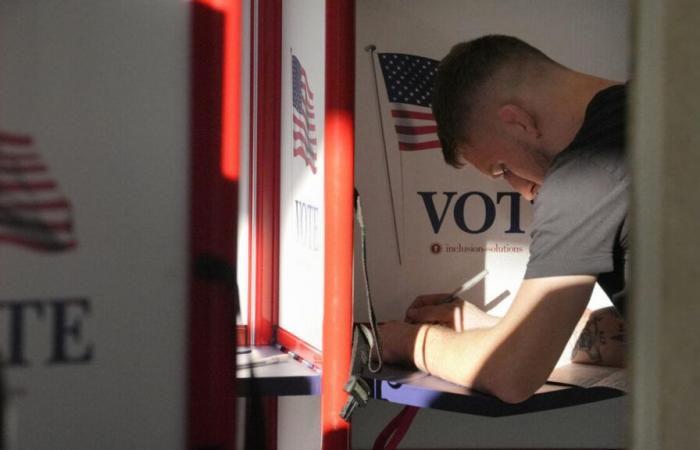After a final day of campaigning, Donald Trump and Kamala Harris returned to their headquarters, while voting began several weeks ago for the more than 80 million people who voted in advance.
With Julien Toureille, researcher in residence at the Observatory on the United States of the Raoul-Dandurand chair at the University of Quebec, in Montreal, first look back at a campaign marked by its share of surprises, from Joe's withdrawal Biden to assassination attempts against Donald Trump.
And immersed in the process of processing early voting ballots, whether postal or validated in person in the offices: verification of the legality of votes by mail through the dates of sending of postal envelopes, a sensitive and placed process under close surveillance, since Donald Trump had made it a hot topic during the 2020 election. This year again, in Pennsylvania, underlines Julien Toureille, “the Republicans would like to cancel a fairly significant number of these ballots transmitted by post”.
The most crucial period of uncertainty will begin this evening or overnight and end on December 11, the deadline by which authorities must certify the votes in each state before the symbolic vote of the electors on December 17.
Fear of Haitians in Springfield, Ohio
Report from our special correspondent Achim Lippold in Springfield, Ohio, meeting with a community Haitian in excitement. Since the false accusations made by the Republican candidate and his running mate JD Vance, according to which Haitians are eating the cats and dogs of the city's residents, a climate of fear has set in, and many of Springfield's Haitian residents are now considering to leave the premises.
“Many Haitians are starting to leave Springfield, they are afraidrelates Philomène Philostin, a merchant of Haitian origin and American citizen for 20 years. This story shocked people, especially children. My own daughters asked me if I had ever eaten dogs! At church, some children tell me that they are harassed at school”
Philomène Philostin, who has always supported the Democratic Party, is preparing to vote for Kamala Harris, in the hope that a woman will come to power in the United States. “A possible victory for Donald Trump worries us a lot, because we really don't know what could happen. »
Also listenAmerican presidential election: after Springfield, the Haitians of Charleroi in Pennsylvania in the crosshairs of the Republicans
Senate, House of Representatives, what are the issues?
Two votes in the shadow of the presidential election, the renewal of a third of the Senate and the entire House of Representatives. These elections promise to be at least as close as the duel between Donald Trump and Kamala Harris and we could witness, observes Julien Toureille, an extremely rare event in American political history: a change of majority in both houses of Congress , on the occasion of the same election.
“The Republicans have a very small majority in the House (220 seats for a majority of 218 seats) and the Democrats are hopeful, thanks to the partisan redistribution of certain districts, particularly in the state of New York, of being able to regain the majority for the Republicans.
In the Senate, it's the opposite, there are 34 positions to be renewed, 23 were in the hands of Democrats, including in Republican-dominated areas, and the Republicans only need a net gain of two seats to regain control.
We are most likely moving towards a form of cohabitation with a president, whoever he may be, who will face at least one of the two chambers of Congress which should not be from his party.
A Donald Trump confronted with a Democratic House of Representatives would pose the problem of adopting budgets, because it is this chamber which initiates the process of examining all budgetary laws, and obviously if the Democrats are in the majority, they will do Donald Trump and the Republicans no favors. For example, they will ensure that the health reform (Obamacare), which has financial dimensions, is not repealed.
In the case of Kamala Harris elected to the presidency with a Senate under Republican control, she would have difficulty getting her nominations confirmed, and initially, perhaps difficulty in assembling her cabinet, the equivalent of her Council of Ministers, because it should give pledges to the Republicans. And in the longer term, difficulties in having his appointments confirmed in the judicial field and we know that the power of appointment of judges during a presidency is a very sensitive subject. »
Julien Toureille, researcher in residence at the Observatory on the United States of the Raoul-Dandurand chair at the University of Quebec, in Montreal, interviewed by Anne Cantener, interview to be listened to in its entirety in the Journal d'Haïti et des Americas today.
Also readThe American presidential election closely scrutinized by Europeans, from all sides






